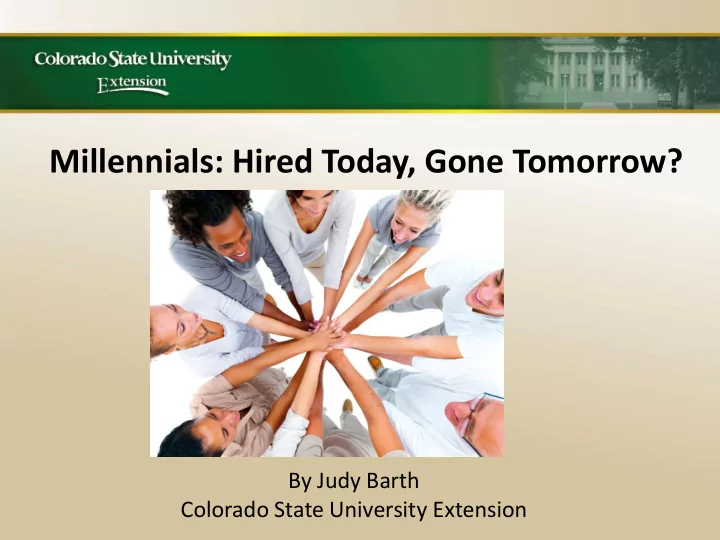

Millennials: Hired Today, Gone Tomorrow? By Judy Barth Colorado State University Extension
Millennials – Who are they? • Generation Y – Born between approximately 1980 and 2000. • 77-80 million in total • 56.6 million are currently 18-35 (34% of the current workforce, 40-50% by 2020)
Definition of Generations Kowske et al. (2010) defines a generation as: “Members who are around the same ages upon momentous events in society, such as wars, social movements, and significant technological advances.”
Millennials – What makes them who they are? • Defining Events • Economy? • Movies/TV? • Heroes? • A CHANGING WORLD!
• https://www.youtube.com/watch?v=bt8cfeB M4mI
Millennials – Stereotypes? • Digital natives, social media • Helicopter Parents • Me-Me-Me! • Creative, bright, expressive, energetic • Intelligent, fast thinking, smart • Sense of individuality • Fun loving
Millennials – who are they, really? • A WANTED generation: – They are special, they can make a difference • A TARGETED generation (Nickelodeon, MTV, products). Individuality is important! • Developmental model of education vs. direct instruction aimed at test taking – SHARING.
Millennial Values – Integrated work/life - Transparency – Fun – Social networks – Informal but polite – Branding/Worth – Family & community – Approachable/ – Diversity accessible leadership – Collaboration/team work – Making a difference – Support – Authenticity – Tolerance – Experiential/interactive – Achievement oriented – Loyalty (to people) – Optimism, hopeful – Dare to be different, individuality!
Millennials – What they believe • Reinvesting in the community • Sustainable practices and products • 44% believe quality of service is most important factor in selecting stores/brands • 55.2% trust companies with positive on-line reviews • Options!
Millennials – In the Workforce • Trying is better than succeeding • 25% of millennials in the work force believe 7 months = loyal employee • 45% of employees 25-34 are looking for a new job • 59% of those are in their current job < 5years = a recipe for TURNOVER!
In the Workforce - continued • 58% of millennials are in their current job < 3 years, average stay is 2-3 years • 52% believe corporate loyalty is outdated • 61% believe they should be promoted every 2-3 years if they are performing well • 91% expect to stay at their job < 3 years • 69% believe daily office attendance is not necessary
What Employers Experience/Believe • 30% lose 15% or more of their millennial workforce each year • 45% report 2x higher turnover rate in millennials compared to older workers • 77% of employers expect recent college grads to stay < 1 year
How to Recruit Millennials 1. Provide access to high-level information - transparency. 2. Give exposure to clients – direct access to who their work affects. How will they contribute/make a difference? 3. Effectively communicate how their role supports the larger organizational strategy and success. 4. Provide a work culture where they feel good about where they work and feel integrated into the organization. 5. Explain how the work and culture is going to benefit them. 6. Describe how the work is effective, fun, and engaging. Alec Levenson
A caution…. “Employers who wait to recruit and engage prospective candidates after a job opening comes available are already losing the race….You have to start building relationships qualifying candidates and establishing a connection far before you have an opening. Otherwise, you are late to your own party.” Jessica Miller-Merrell, chief blogger and founder Of Blogging4Jobs, writing in a recent piece on the TalentCircles website.
Retaining Millennials • Coaching. Raised with constant coaching and feedback. Relationship with boss is key. Once a year evaluations are not enough! • Collaboration . N atural collaborators, particularly when the group’s purpose and goals are understood. • Measures. Raised with a lot of structure and measuring systems. • Motivation. They want a work environment that is comfortable, flexible, family oriented, and which inspires them to contribute without fear of being criticized. Meaningful work! Maximizing Millennials in the Workplace – Brack 2012
Retaining Millennials • Millennials are much less willing to endure unpleasant conditions on the job. Goux, 2012. Millennials in the Workplace. • Provide cooperative/collaborative work – team building • Culture: Upbeat, open, friendly, competitive fun (think Jeff G.) • Ask for their ideas, let them share ideas, don‘t condescend • Help them understand conflict (they have no experience) • Provide opportunities for meaningful contributions • Provide self-directed learning opportunities – embrace technology!
Retaining Millennials • Engagement is KEY! Invest in them. • Treat each employee with respect. TY! • Provide opportunities to accommodate personal and family values. • Provide an upward growth path – up or out. • Keep the doors open for Millennials who leave the organization . “We work to have fun and make a difference.”
Credits • Brack, J. (2012). Maximizing Millennials in the Workplace. • Brack, J. (2014). Managing Millennials in the Workplace. • Goux, D. (2012). Millennials in the Workplace. http://www.Bentley.edu/centers/center-for- women-and-business/millennials-workplace Survey of 1000 millennials. • How Companies Are Managing the Millennial Generation, March 5, 2015, Wharton University. • Human Resource Executive. May, 2015. • Kowske, B., Rasch , R., & Wiley, J. (2010). Millennials’ (lack of) attitude problem: An empieical examination of generational effects on work attitudes. • Kuipers , T. (2012) “Generations in our Communities.” University of Wyoming Extension. • Levenson, A. (2015). Making Sense of the Millennial Generation: What Organizations Need to Know.
• Marston, C. (2007). Motivating the “What’s in it for me” workforce. Hoboken, NJ: Wiley. • Platten, M. (2015). Leveraging Generations in the Workplace. Power Point presentation. • Remson, D. (2015). From 18-80: Thriving in the Multi-Generational Workplace. Power Point presentation.
Recommend
More recommend